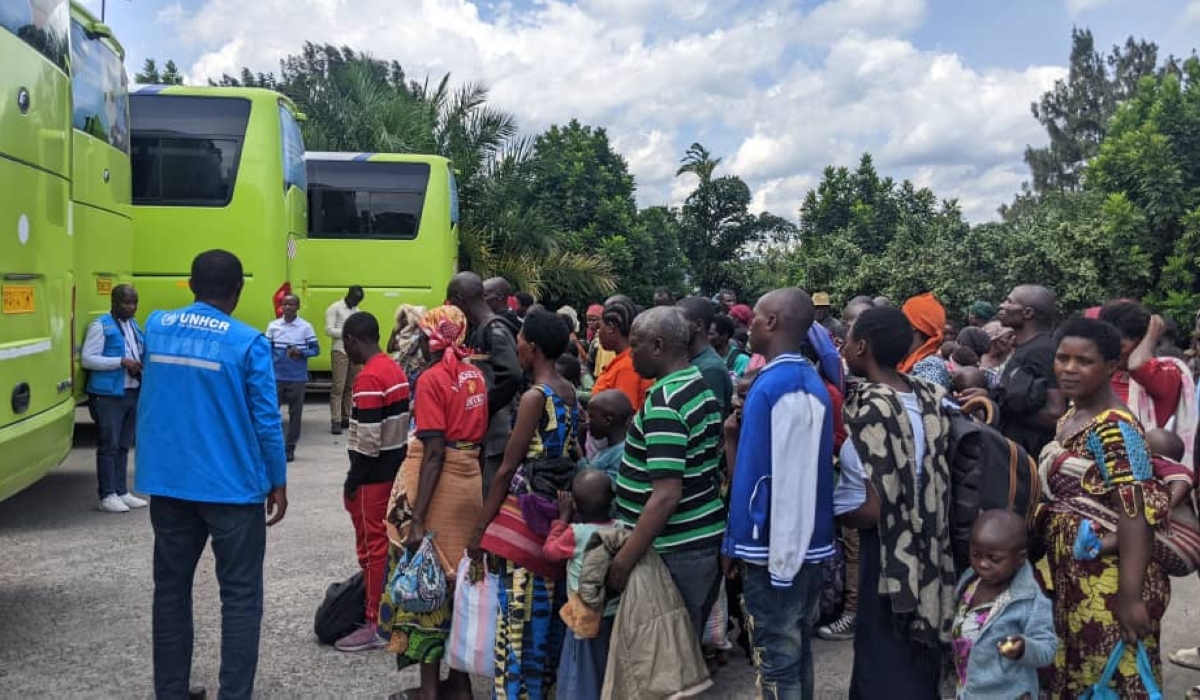
DR Congolese Rwandans returning home with hopes for a better life
Rwandans who just returned from the Democratic Republic of the Congo expressed excitement at the safety and progress of their country after decades of living in dangerous conditions in the neighboring country.
Since Saturday, May 17, more than 1,100 Rwandans who had been held hostage for more than 30 years by the FDLR militia headquartered in the eastern Democratic Republic of the Congo have been transferred to Rwandan authorities and the UN Refugee Agency.
In Rubavu District, the most recent batch of 796 returnees—mostly women and children—crossed the Grand Barrière border station on Monday, joining the first 360 who arrived on Saturday. For two weeks prior to their reintegration into society, they are housed at Kijote Transit Camp in Nyabihu District and Nyarushishi Transit Camp in Rusizi District.
According to official accounts, they are returning as part of the repatriation attempt for about 2,500 Rwandans who are being detained by the FDLR, a group that was established by those who were left behind after the 1994 Genocide against the Tutsi.
Since January of this year, over 4,000 Rwandans have returned from the Democratic Republic of the Congo, joining the 3.5 million who have done so since 1994, according to the Ministry of Emergency Management.
Some of the returnees, including Esperance Uwimana and Theogene Ntibarora, commended the nation’s progress and high readership when they first arrived back home.
“What we have seen is a different story, and we could not have imagined that we would arrive here safely,” Ntibarora said with emotion.
“We left the country long ago, but we have come back again witnessing the country’s development and safety which we are proud of.”
In the war-torn Democratic Republic of the Congo, where over 200 armed factions operate freely, Uwimana thought about life.
“We couldn’t sleep back in Congo because of the warfare and wars. But we’re back home at last because of this nation’s excellent leadership,” she remarked.
Marie Jeanne Furaha, a 25-year-old single mother, also shared her happiness upon returning home to Rwanda.
Furaha crossed the border and remarked, “My parents are from Rwanda, so I feel much safer living here than in Congo.”
“Now that I’m going to see and stay with my family and relatives, I feel safe and no longer afraid.
The returns were welcomed by Maj Gen (Rtd) Albert Murasira, Minister of Emergency Management, who also assured them that they would receive all the assistance they needed to help them reintegrate into society.
On Monday, he informed the repatriates staying at Kijote Transit Camp that they would receive passports that would allow them to travel in Congo or other countries if they so desired, but as Rwandans and not refugees.
“Every issue you are currently facing will be resolved, but you should participate and help the nation grow.”
Rwanda, according to Murasira, has set out on a path toward national unity and everyone’s safety.
He urged them to “feel at home and forget about the perception that Rwanda is not safe.” “We even welcome members of the FDLR and those who committed genocide crimes are held accountable,” Murasira stated.
“Divisionism has been eradicated in Rwanda, contrary to what you have been told back in the Democratic Republic of the Congo.”
All Categories
Recent Posts
Tags
+13162306000
zoneyetu@yahoo.com



